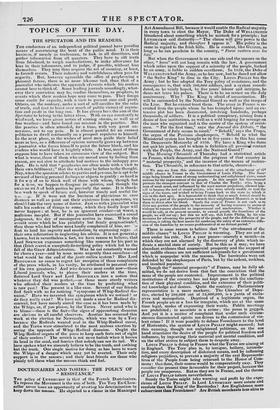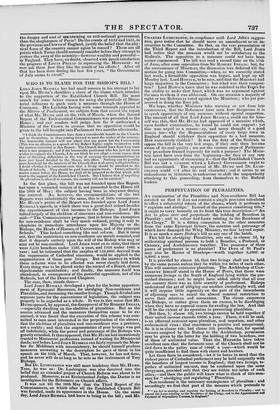DOCTRINAIRES AND TORIES : THE POLICY OF " RESISTANCE."
THE policy of LYNDHURST is that of the French Doctrinaires. To repress the Movement is the aim of both. The Tory Ex-Chan- eellor never loses an opportunity of avowing his determination to keep down the masses. He objected to a clause in the Municipal Act Amendment Bill, because it would enable the Radical majority in every town to elect the Mayor. The Duke of WELLINGTON blundered about something which he mistook for a principle; but LYNDHURST said distinctly—" The clause will give power to the Radical majority, and Therefore I oppose it." His policy is the same in regard to the Irish bills. He is content, like GUIZOT, as long as he can proclaim to the country, " Force resters avec les lois."
But when the Government is on one side and the masses on the other, " force" will not long remain with the law. A government which relies upon the support of a minority of the people, backed by an army, is liable to sudden overthrow. In 1830, the Duke of WELLINGTON had the Army, as he has now, but he dared not allow " the Sailor King" to dine in the City. Louis PHILIP has the Army ; but he has adopted the Tory policy of resistance, and the consequence is, that with 300,000 soldiers, and a system consoli- dated, as he vainly hoped, by five years' labour and intrigue, he dares not leave his palace. There is to be no review on the July anniversary. Why ? The King is afraid of assassination. He will be surrounded by the National Guard as well as the troops of the Line. But he cannot trust them. The army in France is re- cruited from the people whom he has trampled upon; and an ex- tensive plot has been discovered, involving hundreds, perhaps
thousands, of soldiers. It is a political conspiracy, arising from a desire of free institutions, as well as a wild longing for revenge on the man who organized and is the centre of the system of resist-
ance. " For the first time," says the Journal des Debats, " the Government of July seems to recoil." " Behold," says the Temps,
the organ of the Parisian shopkeepers, " Behold to what the Ministerial system has brought us in five years : to this has come the Democratic Monarchy of 1830. We have a King who dares not quit his palace, and to whom is forbidden all personal contact with the People, the Army, and the National Guard !"
The Morning Chronicle of Thursday had a statistical article on France, which demonstrated the progress of that country in " material prosperity," and the increase of the means of instruc- tion. The Chronicle, in reference to that article, observed- " We may see from this statement, the causes of the attachment of the middle classes in France to the Government of Louis Philip. The Sove- reign being himself a man of strong understanding and enlightened views, seems anxious for the improvement of the people. In this respect his Government presents the strongest contrast to that of Charles the Tenth ; who, being a man of weak mind, and influenced by the most narrow prejudices, allowed him- self to become the tool of stupid priests, who were utterly unable to read the signs of the times, and wished to bring France back to the state in which it was in the dark ages. It is lamentable to think that so much hatred should be borne by a part of the population towards their enlightened Monarch as to lead them to thirst after his blood. Surely the state of France is not such as to drive any portion of the people to the necessity of having recourse to means of violence to remove obstacles to improvement and amelioration. Whether it would be safe, at the present moment, to extend greatly the franchises of the people, we will not say ; but this we will say, that Louis Philip, by his wise measures for advancing the prosperity of the people, and for the diffusion of in- struction, is taking the best means for rendering the safety of an extensive diffu- sion of the franchise by no means problematical at no distant period."
There is some reason to believe that " the attschment of the middle classes" to Louis PHILIP is wavering. They are not at
ease under his rule. Not a year passes—scarcely a month—in which they are not alarmed by the discovery of plots which in- dicate a morbid state of society. But be this as it may, we have abundant evidence that commercial prosperity and the support of the middle classes are not sufficient safeguards for a government which is unpopular with the masses. The barricades were not defended by the shopkeepers of Paris, but by the ardent, reckless, and insulted populace.
Though the" material prosperity" of France, may be fully ad- mitted, we do not derive from that fact the conviction that the mass of the people are contented. Improvement in the political institutions of the country has not kept pace with the ameliora- tion of their physical condition, and the extension of their politi- cal knowledge and desires. Quite the contrary. Parliamentary representation is a mere mockery. The Chamber of Depu- ties, elected by 200,000 out of 34,000,000, is a junta of exclu- sives and monopolists. Deprived of a legitimate organ, the French people are at a loss for irregular, which are at the same time legal, modes of expressing their wants. Public meetings are prohibited ; to associate is a crime ; the press is gagged. And yet it is a matter of complaint that under such circum- stances discontented spirits are driven to the commission of vio- lent crime ! If it were possible to debase Frenchmen to the level of Hottentots, the system of Louis PHILIP might succeed; but this cunning, though not enlightened politician, on the one hand stimulates the desire of the people for political freedom and influence, by improving their material and mental condition, and on the other strives to subject them to despotic sway. Louis PHILIP is doing in France what the Tories are aiming at in England. The Tory plan is, by intrigue, bribery, intimida- tion, and every description of dishonest means, and by inflaming religious prejudices, to prevent a majority of the real Representa- tives of the People from being returned to the House of Com- mons: that done, their course would be comparatively easy. They consider the present time favourable for their project, because the people are prosperous. But so they are in France, and the throne of Louis PHI LIP totters nevertheless.
Surely the Tories might take warning and profit by the expe- rience of Louis PHILIP. Is Lord LYNDHURST more astute and resolute than the King of the Barricades? Are Englishmen more subservient than Frenchmen? Are British merchants less alive to the danger and cost of maintaining an anti-national government, than the shopkeepers of Paris? Do the events of 1830 and 1831, in the provinces and towns of England, justify the belief that the phy- sical force of the country cannot again be roused ? These are all points which Tories should seriously consider before they attempt to restore the sway of the minority—however wealthy and powerful— in England. They have, no doubt, observed with much satisfaction the progress of Louis PHILIP in repressing the Movement : we now ask them how they like the result of his efforts ? After all that has been done during the last five years, " the Government of July seems to recoil."



























 Previous page
Previous page